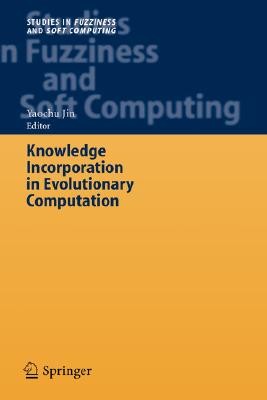| Knowledge Incorporation in Evolutionary Computation 2004 Edition Contributor(s): Jin, Yaochu (Editor) |
|
 |
ISBN: 3540229027 ISBN-13: 9783540229025 Publisher: Springer OUR PRICE: $208.99 Product Type: Hardcover - Other Formats Published: October 2004 Annotation: This carefully edited book puts together the state of the art and recent advances in knowledge incorporation in evolutionary computation within a unified framework. The book provides a comprehensive self-contained view of knowledge incorporation in evolutionary computation including a concise introduction to evolutionary algorithms as well as knowledge representation methods. Knowledge Incorporation in Evolutionary Computation is a valuable reference for researchers, students and professionals from engineering and computer science, in particular in the areas of artificial intelligence, soft computing, natural computing, and evolutionary computation. |
| Additional Information |
| BISAC Categories: - Computers | Computer Science - Mathematics | Applied - Computers | Intelligence (ai) & Semantics |
| Dewey: 006.3 |
| LCCN: 2004111140 |
| Series: Studies in Fuzziness and Soft Computing |
| Physical Information: 1.25" H x 6.14" W x 9.21" (2.13 lbs) 548 pages |
| Descriptions, Reviews, Etc. |
| Publisher Description: Incorporation of a priori knowledge, such as expert knowledge, meta-heuristics and human preferences, as well as domain knowledge acquired during evolu- tionary search, into evolutionary algorithms has received increasing interest in the recent years. It has been shown from various motivations that knowl- edge incorporation into evolutionary search is able to significantly improve search efficiency. However, results on knowledge incorporation in evolution- ary computation have been scattered in a wide range of research areas and a systematic handling of this important topic in evolutionary computation still lacks. This edited book is a first attempt to put together the state-of-art and re- cent advances on knowledge incorporation in evolutionary computation within a unified framework. Existing methods for knowledge incorporation are di- vided into the following five categories according to the functionality of the incorporated knowledge in the evolutionary algorithms. 1. Knowledge incorporation in representation, population initialization, - combination and mutation. 2. Knowledge incorporation in selection and reproduction. 3. Knowledge incorporation in fitness evaluations. 4. Knowledge incorporation through life-time learning and human-computer interactions. 5. Incorporation of human preferences in multi-objective evolutionary com- putation. The intended readers of this book are graduate students, researchers and practitioners in all fields of science and engineering who are interested in evolutionary computation. The book is divided into six parts. Part I contains one introductory chapter titled "A selected introduction to evolutionary computation" by Yao, which presents a concise but insightful introduction to evolutionary computation. |